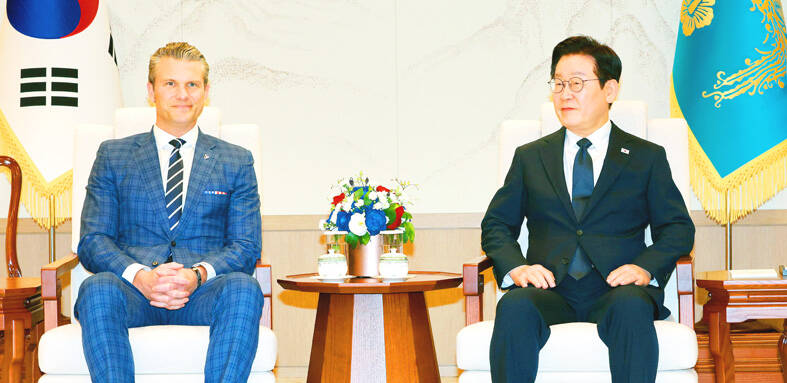South Korea is to triple spending on artificial intelligence (AI) and make its biggest defense budget increase in six years, President Lee Jae Myung said yesterday in his annual parliamentary budget speech.
The South Korean president said 10.1 trillion won (US$7 billion) would go toward “a major transformation aimed at propelling the nation into the ranks of the world’s top three AI powers” alongside the US and China.
“We will significantly expand investment to usher in the ‘AI era,’” he said, adding that the amount was more than three times this year’s AI-related budget.

Photo: EPA
The proposal was made in a speech outlining his government’s spending plans for next year. Overall, the budget plan totals 728 trillion won, an 8.1 percent increase from this year.
Lee needs parliament to pass the budget proposal, which is likely given his party’s majority.
On the defense budget, the president said his government wants to see an 8.2 percent increase from this year to 66.3 trillion won.
If passed, it would mark the highest defense spending increase since 2019.
“We will overhaul conventional weapons systems into state-of-the-art systems suited for the AI era and swiftly transform our military into an elite, smart force,” Lee said.
Praising Seoul’s plan to raise military spending, US Secretary of Defense Pete Hegseth said that the Asian ally would take a larger role in defending itself from North Korean aggressions as the allies must brace for “regional contingencies.”
After annual security talks with South Korean Minister of National Defense Ahn Gyu-back in Seoul, Hegseth told reporters that he was “greatly encouraged” by Seoul’s commitment to increase defense spending and make greater investments in its own military capabilities.
He said the two agreed the investments would bolster South Korea’s ability to lead its conventional deterrence against North Korea.
Hegseth highlighted defense cooperation on repairing and maintaining US warships in South Korea, saying the activities harness South Korea’s world-class shipbuilding capabilities and “ensure our most lethal capabilities remain ready to respond to any crisis.”
“We face, as we both acknowledge, a dangerous security environment, but our alliance is stronger than ever,” he said.
Hegseth said the US-South Korea alliance is primarily aimed at coping with potential North Korean provocations, but must also keep other regional threats in view.
“There’s no doubt flexibility for regional contingencies is something we would take a look at, but we are focused on standing by our allies here and ensuring the threat of the DPRK [North Korea] is not a threat to the Republic of Korea [South Korea] and certainly continue to extend nuclear deterrence as we have before,” he said.
DPRK stands for the Democratic People’s Republic of Korea — North Korea’s official name — while Republic of Korea is South Korea’s formal name.

CALL FOR SUPPORT: President William Lai called on lawmakers across party lines to ensure the livelihood of Taiwanese and that national security is protected President William Lai (賴清德) yesterday called for bipartisan support for Taiwan’s investment in self-defense capabilities at the christening and launch of two coast guard vessels at CSBC Corp, Taiwan’s (台灣國際造船) shipyard in Kaohsiung. The Taipei (台北) is the fourth and final ship of the Chiayi-class offshore patrol vessels, and the Siraya (西拉雅) is the Coast Guard Administration’s (CGA) first-ever ocean patrol vessel, the government said. The Taipei is the fourth and final ship of the Chiayi-class offshore patrol vessels with a displacement of about 4,000 tonnes, Lai said. This ship class was ordered as a result of former president Tsai Ing-wen’s (蔡英文) 2018

UKRAINE, NVIDIA: The US leader said the subject of Russia’s war had come up ‘very strongly,’ while Jenson Huang was hoping that the conversation was good Chinese President Xi Jinping (習近平) and US President Donald Trump had differing takes following their meeting in Busan, South Korea, yesterday. Xi said that the two sides should complete follow-up work as soon as possible to deliver tangible results that would provide “peace of mind” to China, the US and the rest of the world, while Trump hailed the “great success” of the talks. The two discussed trade, including a deal to reduce tariffs slapped on China for its role in the fentanyl trade, as well as cooperation in ending the war in Ukraine, among other issues, but they did not mention

HOTEL HIRING: An official said that hoteliers could begin hiring migrant workers next year, but must adhere to a rule requiring a NT$2,000 salary hike for Taiwanese The government is to allow the hospitality industry to recruit mid-level migrant workers for housekeeping and three other lines of work after the Executive Yuan yesterday approved a proposal by the Ministry of Labor. A shortage of workers at hotels and accommodation facilities was discussed at a meeting of the legislature’s Transportation Committee. A 2023 survey conducted by the Tourism Administration found that Taiwan’s lodging industry was short of about 6,600 housekeeping and cleaning workers, the agency said in a report to the committee. The shortage of workers in the industry is being studied, the report said. Hotel and Lodging Division Deputy Director Cheng

TOKYO SUMMIT: The new Japanese PM’s words have demonstrated Japan’s ‘firm position on urging the prioritization of cross-strait peace,’ the foreign ministry said Minister of Foreign Affairs Lin Chia-lung (林佳龍) yesterday thanked US President Donald Trump and Japanese Prime Minister Sanae Takaichi for supporting peace in the Taiwan Strait, a day after the two at a summit in Tokyo emphasized the importance of regional stability and ahead of a meeting between Trump and Chinese President Xi Jinping (習近平) in South Korea today. The previous day’s meeting was the first time Takaichi had met with the US leader since becoming Japanese prime minister, the Ministry of Foreign Affairs said in a statement. Since taking office on Tuesday last week, Takaichi has urged the international community to